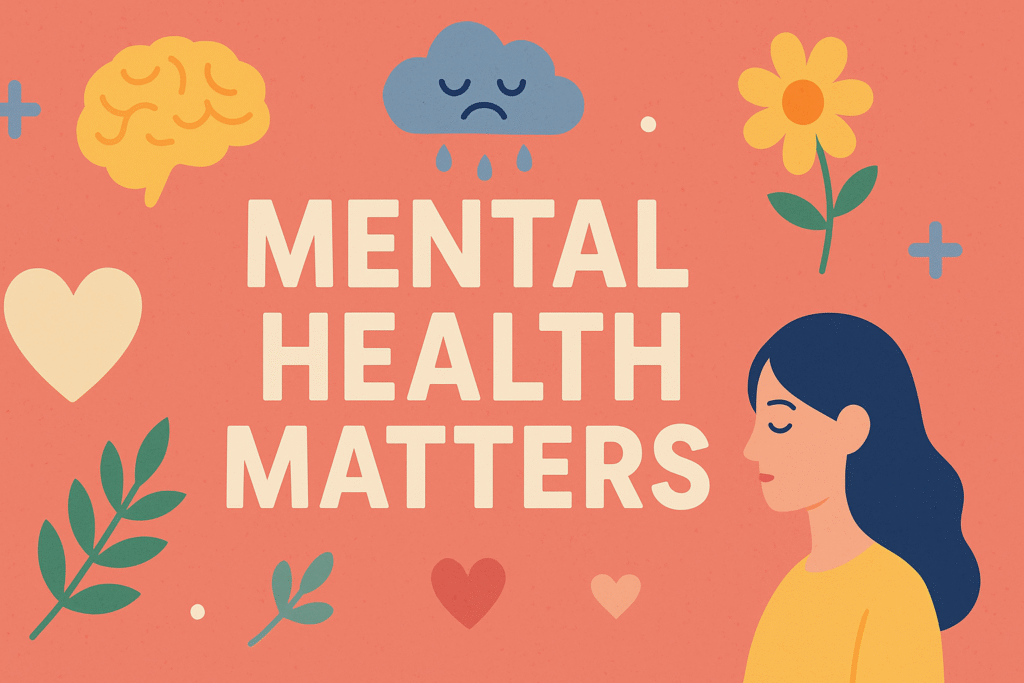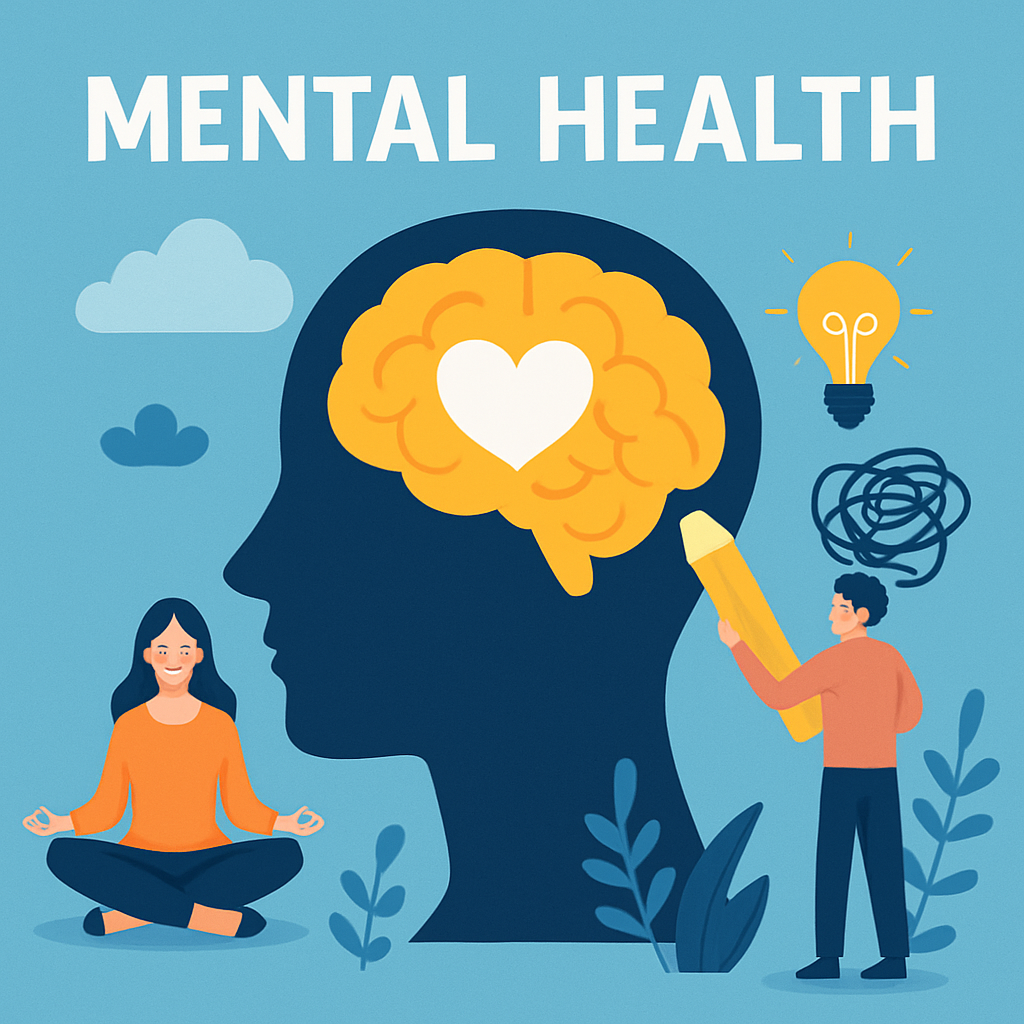When we talk about health and wellness, it typically needs to include workout regimens, balanced diet, or even skincare. Relying totally on these alone would create one gigantic puzzle over which mental wellness has been left out, lost in translation. This world is busier than ever, and so minds need to be cared for as much as bodies. So let’s talk about that—simply and honestly, openly.
What is Mental Health, anyway?
It is not the absence of a mental illness, and it shows the mind I when we think of it. It manifests itself in our emotions, behavior, how to cope with stress, relate to others, and make choices day in and day out. As this body needs exercise and healthy food, the mind requires sleep, kindness, and love.
Mental Health includes:
- Emotional well-being (how we handle feelings)
- Psychological well-being (how we manage thoughts)
- Social well-being (how we relate to others)
If even one of these is compromised, it affects everything — right from sleep all the way to performance, and how we interact with loved ones.

Reasons Why Mental Health Will Be A Big Deal In 2025
The last few years have seen an increase in people openly discussing mental health. Well and good! But, in reality, anxiety, depression, burnout, and loneliness are now all emerging in greater numbers.
Why this irony?
A few reasons could be:
- The tireless pressure of success
- Being glued to online platforms
- Not enough real-life social connection
- Financial stress and job insecurity
- Effects of the pandemic
You could be appearing “fine” from the outside while suffering on the inside. Hence, it matters to check your mental state.
Now, This Is The Signs That Show Your Mental Health Needs Attention
Problems with mental health may not always plunge into breakdowns. They can creep in slowly. Watch for these signs that perhaps something is amiss:
- You feel exhausted despite having adequate sleep
- You find yourself being more irritable, easily angered
- You tend to avoid people and cancel plans more often
- You have lost interest in things you once enjoyed
- Your mind is always thinking or worrying
- You feel stuck, numb, or empty inside
Spotting any of these warning signs earlier would mean that you could act to maintain control before matters begin to spiral.
Taking Care of Your Mental Health (without getting complicated)
Mental health care may not mean retreats or hours of meditation every day. From leaving messages on your phone to taking a couple of deep breaths, little things can actually make big differences.
So, consider the following real-life tips:
- Talk to Someone You Trust
Very often, merely voicing out issues frees the burden a little bit. Whether it is a friend, a family member, or possibly a therapist, talking things out helps relieve stress and feel supported. - Take Breaks, and Guilt-Free Ones
Rest definitely is not laziness; your brain needs a rest just like your muscles do. So, take walks, listen to music, or do absolutely nothing for a while if you feel like it. - Set Boundaries on Social Media
Think about creating a time limit or setting one “no phone” hour in your daily routine. Endless scrolling can create an illusion of inner stupor. But that is, in fact, not true. - Engage in Physical Activity
You need not train for a marathon; stretching, walking, dancing, and yoga are all adequate options. Moving will elevate your mood and put a dent on anxiety. - Sleep – Total Superpower
Shots for 7–9 hours should be aimed for. Poor sleep affects your mood, memory, and focus more than you think. - Eat Food That Feeds Your Brain
Foods such as Omega-3s, whole grains, nuts, fruits, and vegetables all contribute to brain health. Oh, and don’t forget: Your brain needs fuel, so don’t skip meals.
Help and Support Seeking
Moreover, it is acceptable to seek assistance from other people when you have really gone out of every way in self-help and still not getting how you were before. Therapy is for even the serious cases of disorders, but it really is for an individual who wants to get to know and understand themselves better.
And for:
- Online therapy programs
- Helplines for mental health in the area
- Support groups (either face to face or online)
Launching out for help, not weakness but strength mark.
Mental Well Being Support in the Workplace
Very concerned school, but this is all what really matters in the job for most. Some really have started to come up with work-life balance and mental health issues. Mental health days, flexible hours, and counseling—that’s it basically—any workplace decent enough to call itself that should have such facilities.
Employers or team Leads—think about the possibilities for you to create a more supporting environment. And for Employees—stand with us for your needs.
Maladicious Mentality of Young Generations
Only the unfortunate children, teenagers, and young adults bear the brunt of it. Pressure from school, bullying, comparing oneself to everyone on social media, family fights—all those went into the pot. And all too often, sadly, they just don’t know how to say what they would like to express.
Advice to all parents, teachers, and caregivers:
- Form safe environments to talk
- Avoid any judgment or influence
- Encourage open discussions
Weave such behaviors into the fabric of formative years so that stronger and mentally healthier adults will emerge.
The Power of Community
Just having a community means much. Challenges which one may go through without help from friends, family, or any other support members lessen sometimes when an ear is provided at times or a shoulder is leaned against. One feels anything but incapacitated. On the contrary, when the circle is called larger, it becomes less significant for very few such people hold good for ages.
Three Simplest Daily Habits for a Healthy Mind
Habits cannot enlighten one where to start to get on with this business; the little lots one must consider—with rituals.
- Gratitude: Write down three things that you’re grateful for every day
- Goal: Set yourself one small reachable goal that can be achieved within 24 hours
- Outside: Take ten minutes to breathe fresh air outside
- Water: Consume more fresh water
- Compliment: To the other (and one to yourself)
- Music: Listen to that podcast or track that lifts your spirit
Thus, there is no perfection, only right!
The One-Size-Solution for Mental Health – Not:
The crux = given, from anything that pertains to any health analogy downward, any solution it gives matter little, very little, to different people. One may even feel disgusted by even the thought of it. Writing it out helps some; some prefer to talk it out. Some enjoy having company; others prefer silence and darkness. For you, however, it is not comparing your journey to that of others—it’s about your life and mental health.
Keep trying if it doesn’t work. Recovery is not a straight thing; sometimes, it can even be very messy or slow. Just keep trying from where you find yourself and give yourself some grace.
Be Nice to Yourself
A friend having a bad day wouldn’t be judged; why then judge yourself? That is self-kindness, which is very essential for mental health. So, any time you catch a self-critical thought like “I’m not good enough” or “I should be stronger,” take a second and ask yourself would you say that to a friend very much cared for. Life is not all in happiness, but learning to surf through all hard times.

Let’s Normalize Mental Health Conversations
It is high time to start normalising the conversations concerning mental health. The fear of being judged, ignored, or maybe even misunderstood has held too many back from developing an open conversation about mental health for many decades now. And silence helps no one. Purchase Digital products too from here.
Talking about mental health, just casually—like any other health issue—will provide a tapestry of conversation that others will feel safer in tapping into.
Instead of simply throwing around clichés, share a personal thought:
“Just snap out of it” can make way for “I am here for you. What do you need?”
Now You Know: Your Mind Also Needs Attention
Without being a trend, mental health is being termed the very essence of well-being. A stable mind makes everything else fit their place smoothly.
